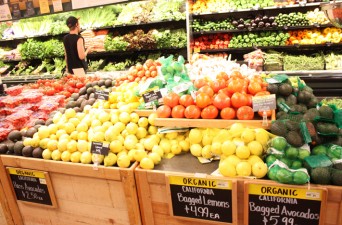This part of the “Healthy Series” discusses the importance of Nutrition and eating well.
Food is a part of our sustenance and what we eat determines how we feel. We must nourish and look after our bodies for them to respond well physically.
When it comes to summing up healthy eating, author Michael Pollan may have said it best — “Eat food. Not too much. Mostly plants.” By ‘food,’ he means food that grows from a plant, not a ‘food-like product’ manufactured in a factory.
Eating the appropriate amount is paramount. Maintaining weight is a matter of calories consumed and calories burned. As for “mostly plants,” eating a balanced plant-based diet has been shown to promote optimal health.
There are many people who want to eat a healthy diet, but simply don’t know where to start. For those who need guidance, there is a full-time dietitian on staff at Stamps Health Services.
“I recently went to the [health] center at Tech and spoke to the nutritionist there. She was really helpful and gave me some websites to look at,” said Carlos Galloza, a fourth-year EE major.
Eating healthier does not have to be an all-or-nothing endeavor. Small changes can go a long way to leading a healthier lifestyle.
Galloza avoids keeping junk food in his apartment to make eating healthy easier.
“I do not buy sweets or snacks since I’m a habitual snack eater…I always have a stock of fruit in my refrigerator to snack on so I’m less tempted to go out and eat,” Galloza said.
Other small changes include eating grilled meat rather than fried and choosing lower-calorie condiments, such as mustard over mayonnaise.
For those on a tight budget, purchasing healthy, unprocessed foods does not have to break the bank. Oatmeal can be bought in bulk and makes a satisfying breakfast, especially with added nuts and a banana. Dried or canned beans, peanut butter, and eggs are all great sources of protein and are budget-friendly.
Frozen fruits and vegetables are a good alternative to fresh produce and can be bought in bulk when on sale. Whole grains are also nutritious and filling and can be bought for cheap.
For those frequenting Tech’s dining halls, Sodexo, Tech’s food and dining service provider, has revamped its menus to include a greater variety of healthy options, including Mediterranean cuisine.
“For students who are interested in healthy options, we offer many items that are baked, steamed and grilled,” said Andrea Preininger, Marketing Manager of Georgia Tech Dining.
The dining halls also make healthy substitutions in their cooking just as many people do at home.
“We use low-fat items such as skim and 2 percent milk in recipes, olive oil instead of vegetable oil, and apple sauce instead of oil,” Preininger said.
Portion control is an issue for many people. Using smaller plates and glasses can help alleviate this issue, as can employing a Japanese strategy called ‘Hara Bachi Bu’, which means eating until eighty percent full.
Remember that health is as much practice as it is produce, the more conscious thinking and effort applied to dieting the better the results.

